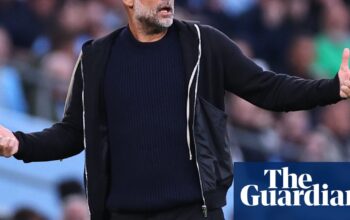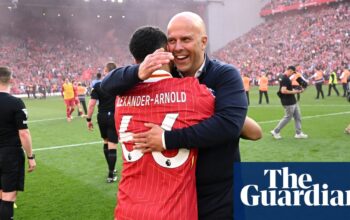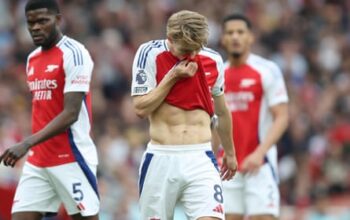The first time the Glazer family visited Old Trafford, in June 2005, they paid a visit to the megastore. Outside, hundreds of furious Manchester United fans turned up with banners and placards, shouted slogans such as “Die Glazer die”, and a few clashed with police. Inside, the Glazers were doing a spot of – and here we must stretch the word to its broadest possible definition – shopping.
For Joel, Avram and Bryan had no intention of doing anything quite as undignified as parting with their own cash. Instead they swarmed the aisles, scooped up armfuls of replica shirts and merchandise, which shop staff dutifully ran through the tills and bagged up. When the time came to leave, the Glazers simply took the bags and left. This was, after all, all their own property, theirs to take and use as they pleased. And as a metaphor for how they intended to run Manchester United over the next 20 years, it is about as good as any.
Sir Bobby Charlton would later apologise to the Glazers for the hostile reception they received from fans on their first visit. David Gill, the chief executive who had initially resisted the takeover, was the man who greeted them at their car, smoothed the transition and was rewarded with a doubling of his salary. Sir Alex Ferguson, perhaps the one figure capable of stopping the takeover dead in its tracks, repeatedly refused to do so, telling a bunch of disgruntled fans on a trip to Budapest to “go and support Chelsea” if they were dissatisfied with the way United were being run.
The Labour government, deep in election mode, refused to scrutinise the takeover despite the urging of many of its own MPs. And for all the diligent reporting of the takeover in many sections of the press, there were also plenty of journalists happy to take the inside line in return for a stream of Glazer PR. All of which serves, two decades on, as a reminder that for all their single-minded brazenness, the Glazers did not act alone.
On the contrary: at every turn they were abetted by the pliant and the opportunistic, the spineless and the unprincipled. Dissent, whether from outraged fans or concerned directors, was either ignored or extinguished. Contrary to common belief, the Glazers did invest a little of their own money in buying United: much of it raised through refinancing of their retail property empire.
But of course the bulk of the purchase was funded by debt. And not simply of the pecuniary kind, either: a debt of morals and safeguards, a debt of oversight and care, a debt of courage and conviction, an original sin for which not just United but English football as a whole is still paying heavily.
Ferguson would continue not simply to tolerate the Glazers but to defend them at every opportunity. Seven years later, on a pre-season tour of South Africa, he rounded on United fans who still opposed the regime. “There are a whole lot of factions at United that think they own the club,” he said. “The majority of the real fans will look at it realistically and say it’s not affecting the team.”
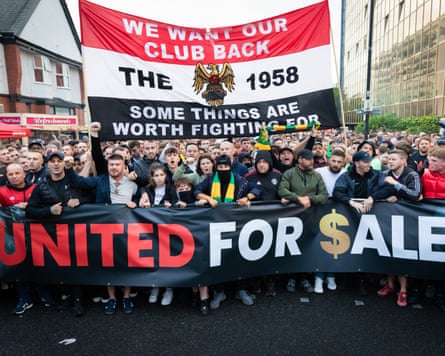
Many of Ferguson’s quotes have aged like fine wine. This one, it’s safe to say, has not. And not simply because performances on the pitch since his departure have shattered the illusion that the United trophy machine and the Glazer cash machine could somehow coexist in perpetuity. For in the sophistic dichotomy between “real fans” and fans who “think they own the club” is revealed a pure disdain for the paying public, a vision of the game in which the job of the fan is simply to cheer, to vindicate, while being told exactly what it is they should want.
This sense of palpable disenfranchisement is perhaps the most toxic inheritance of the Glazer takeover. Unlike many of English football’s big recent takeovers – Chelsea, Manchester City, Newcastle, Arsenal – the sale of United has been loudly and vocally resisted at almost every turn. Many of the more disillusioned fans broke away to set up FC United of Manchester, still fighting the good fight in the Northern Premier League. There was the green and gold movement of 2010, the arrival and swift departure of the Red Knights, the protests of 2021 and 2022, the tireless and often thankless work of supporters’ groups.
None of which really managed to move the dial. Ineos and Sir Jim Ratcliffe now provide a public face and a handy lightning rod for criticism. Communications between the board and the fanbase have incrementally improved in the days since Gill refused even to engage with fan groups such as the Manchester United Supporters Trust on the basis that they were “at war with the owners”. There is now long-overdue investment in the training facility and a long-overdue new stadium in the planning.
There are, as there always are, fleeting glimpses of promise on the pitch. But the fundamentals of the transaction have not altered. The Glazers are still there, still unmovable, still loading the club with debt and debt interest that totals more than £1bn since the takeover. And £1bn is a lot of money. It would certainly have paid for a lot of the staff laid off so indelicately by Ratcliffe over the past few months. It would have funded significant improvements to Old Trafford. It would have made a very handy transfer war chest for Ruben Amorim. Where can it have gone?
after newsletter promotion
By a weird coincidence, £1bn is not a million miles away from the amount of money – net – that the Glazers are estimated to have earned from United in annual dividends and share sales, once you take out their initial outlay. And of course they fattened the asset appreciably in the meantime. The piecemeal sponsorship model – in which every part of the club was essentially reimagined as a high-end advertising space – became the dominant commercial model in the sport.
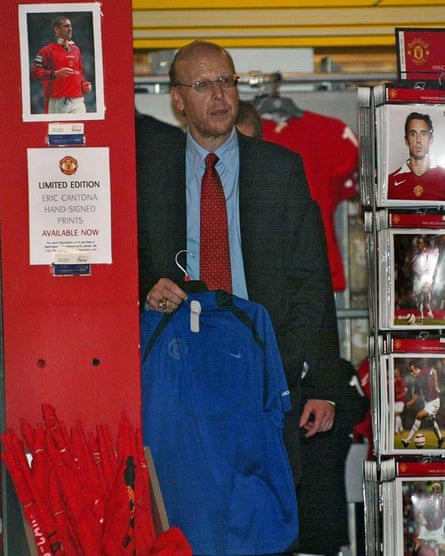
The audacity of purchasing the club using high-interest hedge-fund loans is spoken of in reverentially hushed tones within the game. The reimagination of transfer business as a form of theatre – an instrument not simply of team-building but of branding, clout, supporter PR – is another phenomenon not invented by United but certainly perfected by them. The re-signing of Cristiano Ronaldo in 2021 – a transfer that has to be seen in the context of the Super League protests earlier that year – made no sense for United the team, but was a clear win for United the brand, albeit one that has come with a heavy knock-on cost.
This is, or was, your money. It came from your season ticket, your club shop purchase, your satellite television subscription, your Nissin noodle. For all the opacity and financial jargon, perhaps the simplest way of conceiving the Glazer takeover is as a kind of aggressive counter-revolution: a massive direct transfer of wealth from the fan to the owner. And in the process, the sanctification of the principle that a football club does not exist for its public, or for its community, or for its heritage, but purely as a vehicle for generating wealth for one family, for as long as they choose.
Have we learned anything in two decades? The leveraged buyout was finally banned in 2023, the independent regulator is finally being winched into existence, and across the sport there is a greater awareness of the dangers of malign ownership, of unaccountable power, of creating a class that is basically untouchable. For all this precious little has changed at United except the league position, except the evaporation of hope and the increasingly forlorn balance sheet.
In the meantime, the Glazers continue to sit upon their still-appreciating asset, monarchs atop the throne of rentier capitalism. Meanwhile your club has no money. Your council has no money. Your government has no money. Your family has no money. Everyone you know is fighting ever more bitterly over smaller and smaller slices of what we once comically believed was our common inheritance. The Glazer ownership of Manchester United is a sporting tragedy. But in a way, it’s also a parable for where we all went wrong.
Source: theguardian.com
